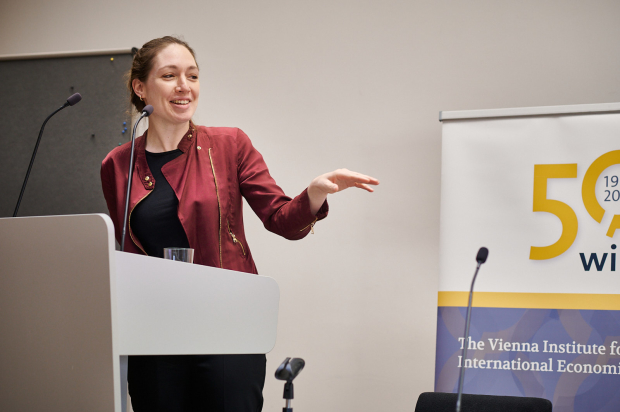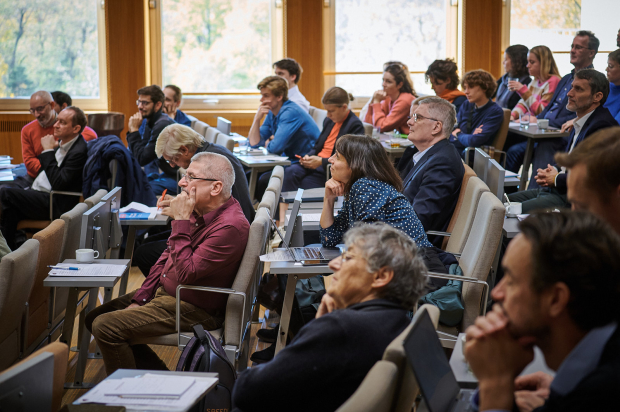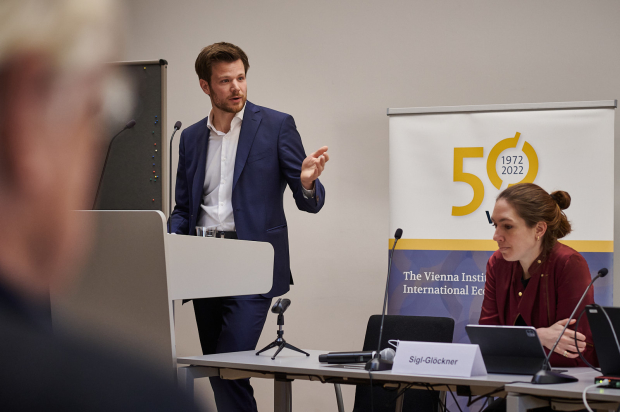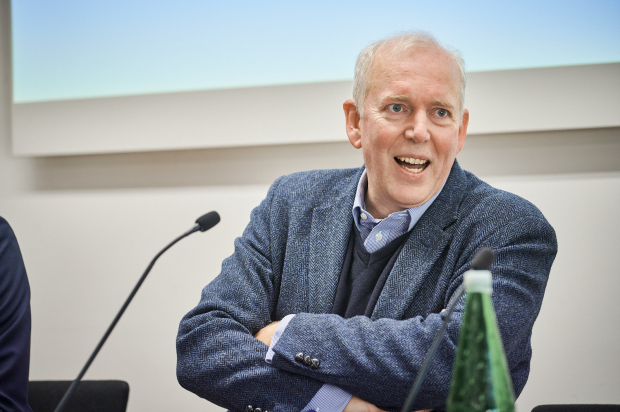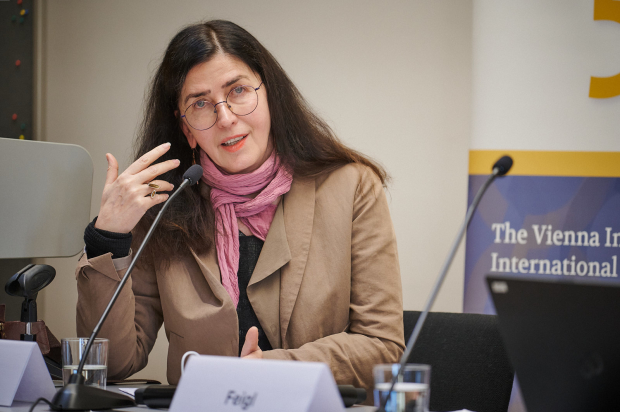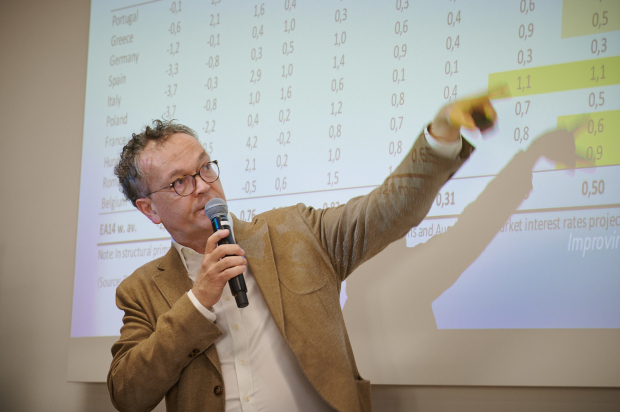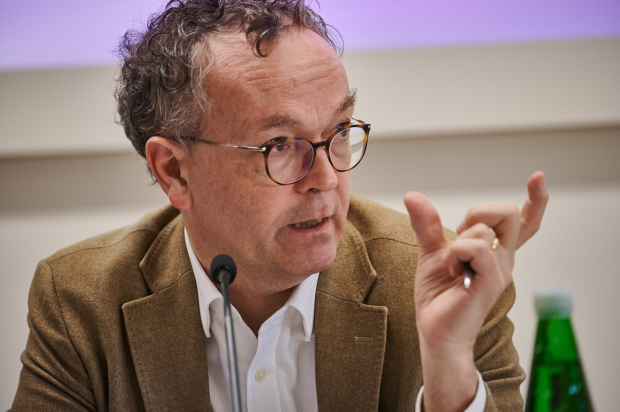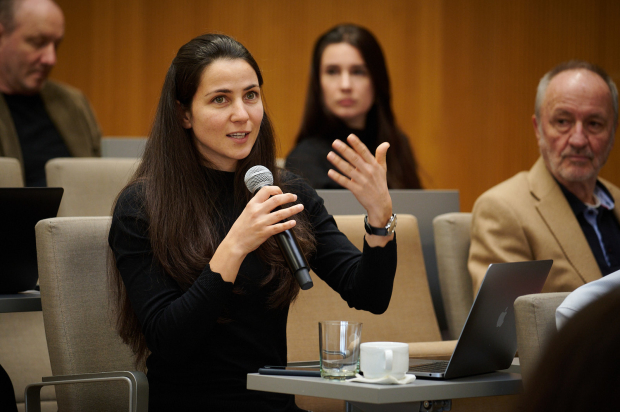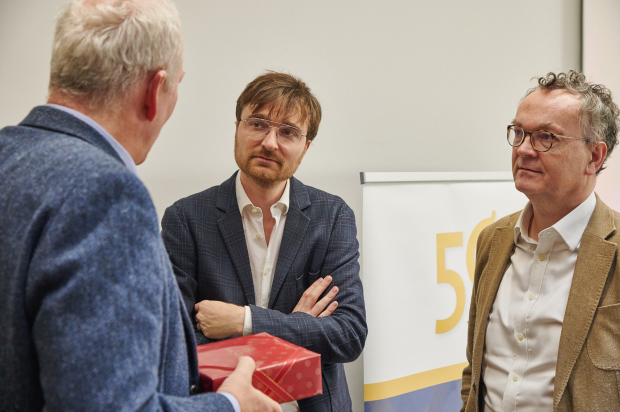Fiscal policy for the 21st century – meeting economic, social and climate challenges
13 December 2023
Summary of our conference with the European Macro Policy Network and Dezernat Zukunft on alternative fiscal policies, including discussions on climate investment and fiscal rules
image credit: wiiw/Hans Schubert
On November 22nd and November 23, the Vienna Institute for International Economic Studies (wiiw) hosted the second conference of the European Macro Policy Network (EMPN). With over 150 participants over two days, it was a great opportunity to reflect on the economic, political and climate challenges Europe is currently facing.
wiiw is very grateful to Dezernat Zukunft, the Berlin-based macro-finance think-tank that coordinates the EMPN [1], for mutual support in organising the conference. The Chamber of Labour Vienna (Arbeiterkammer Wien) also provided generous support.
The first day of the event (November 22nd) was an internal workshop, reserved for EMPN members. Personal relationships within the network were deepened and strengthened. The members shared overviews of their work – from discussions on industrial policy and fiscal policy to new approaches to quantifying climate debt – and exchanged ideas for future collaboration.
The public event
The second day was open to the public and consisted of three keynote speeches and panel discussions on “Fiscal policy for the 21st century: Meeting economic, social and climate challenges”.
As the focus of the program was on fiscal policy, the recent ruling of Germany’s Federal Constitutional Court and its broader implications added urgency to the discussions. The day was broadcast via livestream. The recording can be viewed here.
After welcoming speeches by Philipp Heimberger (wiiw) and Philippa Sigl-Glöckner (Dezernat Zukunft), the day began with its first highlight, a keynote speech by Jakob von Weizsäcker, State Minister of Finance of Saarland. Von Weizsäcker explained how he launched a € 3 billion transformation fund to give businesses and the public sector in Saarland the support they need to achieve their climate goals while preserving the country's fiscal rule and its industrial ecosystem.
The core of von Weizsäcker’s speech was the challenge of the "sustainability triangle": the balance between fiscal, political and climate sustainability. At the German and European level, he discussed three possible solutions to Germany’s current fiscal troubles after the constitutional court shot down a € 60 billion off-budget climate fund: introducing a special transformation fund, similar to the existing special fund for the German armed forces; implementing a reform of the constitutional debt brake; and launching a European financing instrument for climate investment that builds on the lessons learned from the EU’s COVID-19 recovery fund Next Generation EU.

from left to right: Helene Schuberth, Georg Feigl, Jakob von Weizsäcker, Mario Holzner, Dario Guarascio
In the panel discussion that followed, Helene Schuberth (Austrian Trade Union Federation - ÖGB), Georg Feigl (Chamber of Labour Vienna – Arbeiterkammer Wien) and Dario Guarascio (Sapienza University of Rome) discussed von Weizsäcker’s presentation and provided additional input on the issue of climate investment. The session was moderated by Mario Holzner, Executive Director of wiiw.
After a short coffee break, Jeromin Zettelmeyer, Director of the Brussels-based think tank Bruegel, gave the second keynote speech.
He explained and analysed the reform proposals based on Debt Sustainability Analysis (DSA) that are currently being discussed in the EU fiscal rules reform process. While Zettelmeyer highlighted some positive aspects, he criticised a lack of ambition and transparency in the current proposals. His suggestions for improvement focused on the so-called "safeguards" currently under negotiation, rules that prescribe minimum fiscal adjustment requirements in addition to the DSA-based requirements. He argued for a fiscally sustainable green golden rule as his preferred solution. The subsequent discussion was moderated by Philippa Sigl-Glöckner.
Jens van 't Klooster, Professor of Political Economy at the University of Amsterdam, opened the afternoon with a presentation on how to deal with public debt in the context of climate change.
He emphasised that existing institutions are not prepared for the challenges of climate change, in particular due to a lack of coordination between the European Central Bank and finance ministries in the euro area. Van 't Klooster recommended strengthening fiscal-monetary coordination and proposed measures such as the abolition of haircuts for supranational EU debt and making better use of the European Stability Mechanism. Clara Leonard (Avant-garde Institute), Johannes Holler (Fiscal Council Austria) and Paul Pichler (University of Vienna) then discussed these ideas, with Philipp Heimberger moderating.
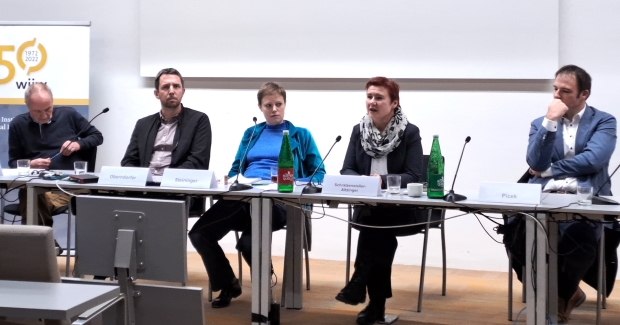
from left: Kurt Bayer, Lukas Oberndorfer, Lea Steininger, Margit Schratzenstaller-Altzinger, Oliver Picek
The day ended with a panel (in German) on interdisciplinary perspectives on fiscal policy. Lukas Oberndorfer (Vienna Chamber of Labour) spoke about how to finance the green transition, Lea Steininger (wiiw) discussed the link between fiscal policy and full employment, Margit Schratzenstaller-Altzinger (Austrian Institute of Economic Research - WIFO) spoke about tax policy, and Oliver Picek (Momentum Institute) discussed the stabilisation role of fiscal policy. Kurt Bayer (wiiw) moderated the panel.
[1] The EMPN is a European network for deepening intra-European exchange on macroeconomic policy. It links thirteen organisations in seven EU countries, including think tanks in Sweden, France, Finland and the Netherlands, and research groups in Germany, Austria and Italy. While experts of the member organisations are anchored in their respective national contexts, they share a common goal: improving Europe's macro-financial architecture. In this regard, the EMPN is a unique link between European and national debates and decision-making spaces.

